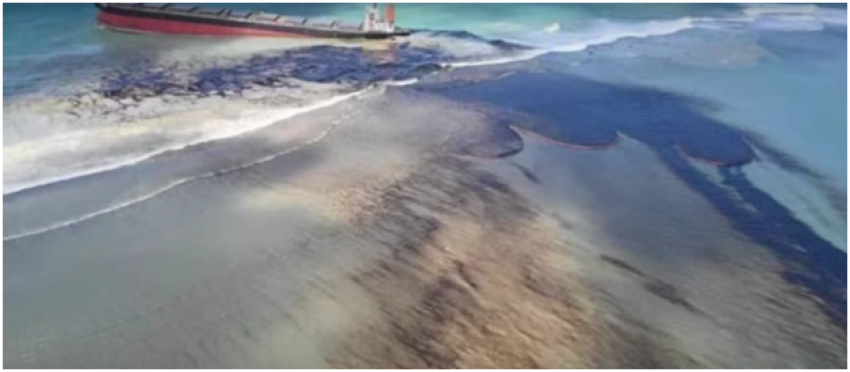
Fuel spilling from a Japanese bulk carrier that ran aground on a reef in Mauritius two weeks ago is creating an ecological disaster, endangering corals, fish and other marine life around the Indian Ocean island, officials and environmentalists say.
Media reports estimate that 1000 tons of bunker fuel oil has already leaked into the ocean.
The MV Wakashio, owned by the Nagashiki Shipping Company, struck the reef on Mauritius’ south-east coast on July 25.
The tanker is 299.5 metres long and 50 metres wide and has a crew of 20. It is flagged in Panama with Okiyo Marine, an affiliate of Nagashiki Shipping, listed as the owner.
Ecosocialist movement Rezistans ek Alternativ (RA) reported that the Japanese-owned (Mitsui-operated) MV Wakashio was en route to Brazil from China to fetch iron ore from a port owned by notorious mining company Vale.
The ship ran aground near Blue Bay, one of the area’s most pristine sites for coral, which is already threatened by bleaching, due to the climate crisis.
After nearly two weeks of government inaction and denial, and a lack of action by Mitsui, waves pounded the ship so hard that it began to crack.
In addition to organising popular resistance and education about government and corporate irresponsibility, RA has adopted a practical approach to the disaster. Their volunteers have gathered sugar cane straw offcuts and plastic, to create effective 25-metre-long booms to prevent the oil from spreading.
276 RA volunteers deploying booms made of sugarcane straw to stem the spread of oil.jpg

On August 6, Prime Minister Pravind Kumar Jugnauth declared a state of environmental emergency, pleading for international help.
“The sinking of the #Wakashio represents a danger for Mauritius,” Jugnauth said.
Greenpeace said the spill is likely to be one of the most terrible ecological crises Mauritius has ever seen.
“Thousands of species around the pristine lagoons of Blue Bay, Pointe d’Esny and Mahebourg are at risk of drowning in a sea of pollution, with dire consequences for Mauritius’ economy, food security and health,” Greenpeace said.
Wildlife workers and volunteers ferried dozens of baby tortoises and rare plants from an island near the spill, Ile aux Aigrettes, to the mainland as fears grew that worsening weather on August 9 could tear the Japanese-owned ship apart along its cracked hull.
A further 2500 tons of oil could escape if the tanker continues to break up.
“That’s the big question,” said Jean Hugues Gardenne of the Mauritian Wildlife Foundation “Why that ship has been sitting for long on that coral reef and nothing being done.”
This disaster re-emphasises how “Blue Economy” ocean commodification is threatening the African coastline.
US ecosocialist John Bellamy Foster spoke in Mauritius in October 2019 and warned: “In terms of the coral reefs and all the dangers to the ecosystems, Mauritius is one of those countries most at risk.
“If they don’t stick to the 1.5 °C target, Mauritius will lose its coral reef and all the fisheries associated with that. Period. The coral reef affords protection in terms of sea levels rising, so there will be that problem that will rear up.”
More on that ecosocialist battleground, entailing both critique and activism, can be found in the Journal of Political Ecology report, “Blue Economy threats, contradictions and resistances seen from South Africa”.
This is a very serious challenge for activists, as they put increasing pressure on the authorities to take accountability and limit damage, as their Indian Ocean campaigning against the Blue Economy takes on added urgency and universal relevance.
[Abridged from Global Ecosocialist Network.]